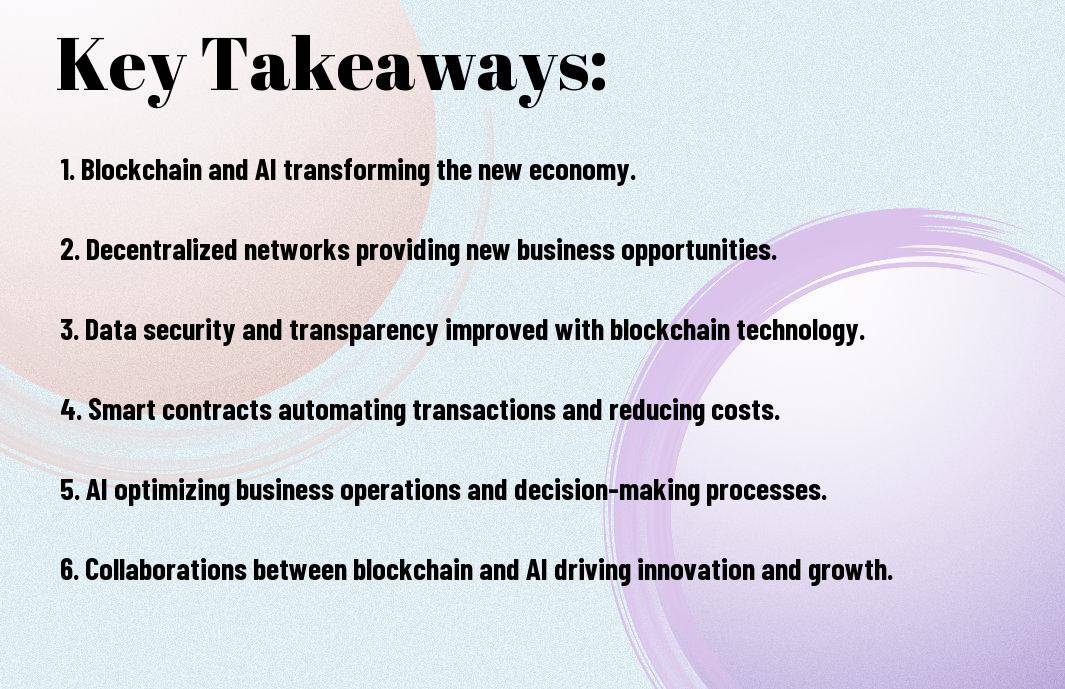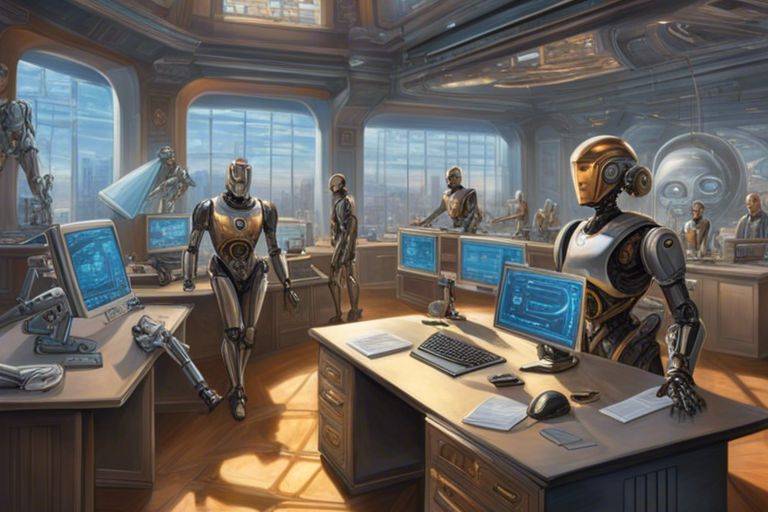Just a few years ago, the integration of blockchain and artificial intelligence seemed like a distant concept reserved for the tech-savvy. However, as technology continues to advance at a rapid pace, these two cutting-edge innovations are reshaping the way we do business and interact with the digital world. In this blog post, we will explore how blockchain and AI are revolutionizing the economic landscape and creating new opportunities for growth and efficiency.

Key Takeaways:
- Blockchain and AI are revolutionizing the business world by providing secure, transparent, and efficient transactions.
- Decentralization is a key feature of blockchain technology, enabling peer-to-peer transactions without the need for intermediaries.
- Smart contracts powered by blockchain can automate and enforce agreement terms, reducing the need for traditional legal processes.
- Data security is significantly improved with blockchain’s immutable and decentralized nature, making it a preferred choice for sensitive information.
- AI algorithms are enhancing decision-making processes by analyzing vast amounts of data to extract valuable insights and predict market trends.
- Collaboration between blockchain and AI technologies can create synergies that drive innovation in various industries, such as healthcare, finance, and supply chain management.
- Regulatory challenges around blockchain and AI adoption are being addressed through increased awareness, education, and industry collaboration to ensure responsible use and compliance.


The Evolution of Economic Systems
There’s a significant shift happening in the world of economics, driven by technological advancements such as blockchain and AI. These innovations are paving the way for a new era of digital economy. One such example is DDO Chain: The Integration of AI and Web3, Paving the Way for a New Era of Digital Economy, which showcases the potential of AI and decentralized technologies in shaping our economic landscape.
Historical Perspectives on Economy and Tech Innovations
Economy has always been closely intertwined with technological advancements throughout history. From the agricultural revolution to the industrial revolution, each wave of innovation has transformed the way we produce, distribute, and consume goods and services. The integration of blockchain and AI technologies represents a new chapter in this evolution, promising increased efficiency, transparency, and security in economic transactions.
Characteristics of the New Economy
Characteristics of the new economy, ushered in by blockchain and AI, include decentralization, automation, and data-driven decision making. These technologies enable peer-to-peer transactions without the need for intermediaries, streamline processes through automation, and leverage big data for more informed business strategies. Another key characteristic is the emphasis on digital assets and currencies, which are redefining the concept of value exchange in the digital age.
Another crucial aspect of the new economy is the potential for inclusivity and global connectivity. These technologies have the power to bridge gaps in access to financial services and empower individuals and businesses worldwide. However, it’s necessary to navigate the risks associated with digital economies, such as data privacy concerns and cybersecurity threats, to ensure a sustainable and equitable economic system.
Blockchain Fundamentals
Now, let’s explore the fundamentals of blockchain technology. Blockchain is a decentralized digital ledger that records transactions across a network of computers. Each transaction is stored in a “block” that is linked to the previous one, creating a chain of blocks – hence the name blockchain. This technology ensures that transactions are secure, transparent, and tamper-proof.
One of the most important aspects of blockchain is its ability to provide transparency. Since every transaction is recorded and linked to previous ones, it is nearly impossible to alter or delete information without the consensus of the network. This feature makes blockchain a highly secure way to conduct transactions.
On the flip side, one of the dangerous aspects of blockchain lies in the potential for 51% attacks. If a single entity or group controls over 50% of the network’s computing power, they could potentially manipulate the ledger. However, this scenario is highly unlikely in larger blockchain networks due to their distributed nature.
Despite the risks, the positive implications of blockchain technology are vast. From increasing efficiency and reducing costs in supply chain management to enabling secure and instant cross-border transactions, blockchain is revolutionizing various industries. Its impact on the global economy is undeniable.
If you’re interested in learning more about the intersection of blockchain technology and sustainable business practices, check out this insightful article on Circular Economy and Blockchain: Paving the Way for Sustainable Businesses.
FAQ
Q: What is the new economy?
A: The new economy refers to an emerging economic system that is characterized by the integration of advanced technologies such as blockchain and artificial intelligence (AI) to drive innovation and facilitate new business models.
Q: How are blockchain and AI shaping the new economy?
A: Blockchain technology provides a decentralized and secure platform for conducting transactions, while AI enables automation, predictive analytics, and personalized experiences, both of which are crucial for driving efficiency and innovation in the new economy.
Q: What are some key benefits of blockchain in the new economy?
A: Blockchain technology offers benefits such as increased transparency, enhanced security, reduced costs, improved traceability, and greater efficiency in processes like supply chain management, financial transactions, and identity verification.
Q: In what ways does AI contribute to the new economy?
A: AI algorithms and machine learning systems help businesses analyze vast amounts of data, derive valuable insights, automate repetitive tasks, personalize customer experiences, optimize operations, and drive innovation in sectors like healthcare, finance, and transportation.
Q: How are blockchain and AI being used together in the new economy?
A: Blockchain and AI are often integrated to create synergies that leverage the strengths of both technologies. For example, AI can be used to enhance blockchain data analysis and decision-making processes, while blockchain can provide a secure and transparent infrastructure for AI applications.
Q: What are some challenges of implementing blockchain and AI in the new economy?
A: Challenges include regulatory uncertainty, scalability issues, data privacy concerns, interoperability problems, talent shortages, cybersecurity risks, and the need for ongoing education and awareness about the potential of blockchain and AI technologies.
Q: What opportunities do blockchain and AI present for businesses in the new economy?
A: The integration of blockchain and AI opens up opportunities for businesses to create new revenue streams, improve customer experiences, streamline operations, enhance data security, drive innovation, gain competitive advantage, and adapt to the rapidly evolving digital landscape of the new economy.



